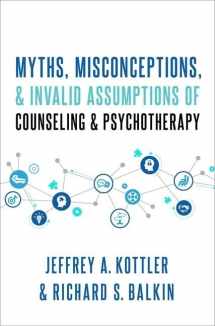
Myths, Misconceptions, and Invalid Assumptions of Counseling and Psychotherapy
Book details
Summary
Description
There are certain assumptions about the practice of counseling that are accepted as "truths," beliefs that are so pervasive that they remain unchallenged by almost all practitioners of all persuasions and approaches. In this book noted authors Jeffrey Kottler and Rick Balkin cover a wide range
of myths, misconceptions, and assumptions that have remained unchallenged or that have little research to support their efficacy. Topics covered include the sacrosanct "50 minute hour," how basic research is conducted and whether the results inform actual practice, why progress made in therapy often
doesn't last, what social justice actually means, and what makes someone an effective therapist.
Each chapter describes an issue, explores the way it operates in daily practice, and then presents empirical evidence to question or challenge its current use. In cases where there is little or no definitive research to support or refute the procedure, belief, or practice the authors present some
critical questions that will at the very least encourage counselors to reflect on what they do and why.


We would LOVE it if you could help us and other readers by reviewing the book
Book review



